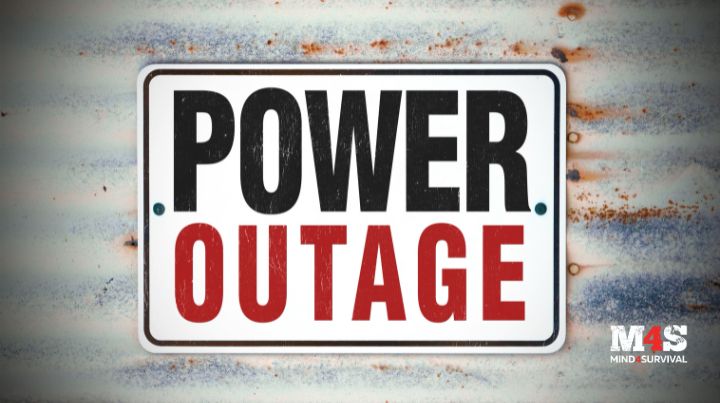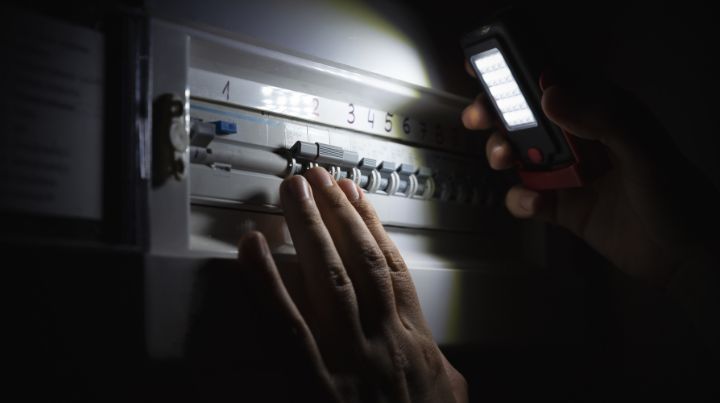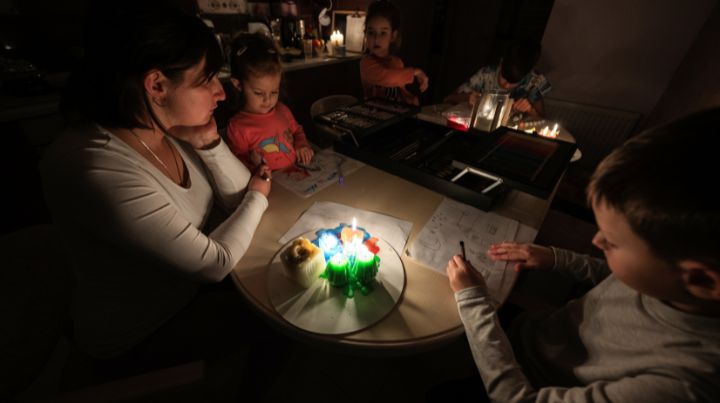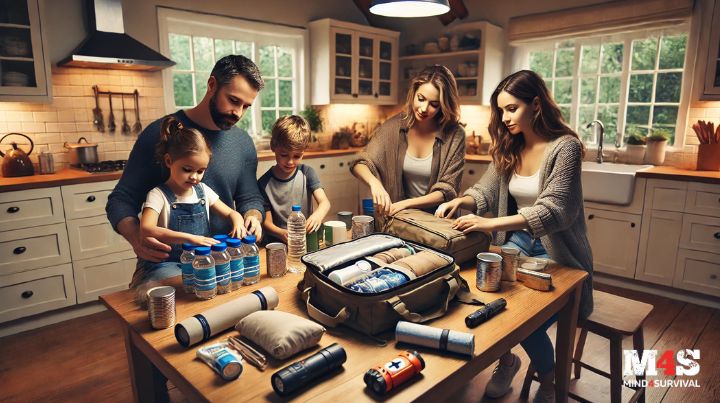Prepping For A Power Outage

Power outages can occur at any time of the year, so it's smart to be prepared for them at all times. In this article, we’ll discuss how to prepare for a power outage, including supplies and tips for staying safe and comfortable during a blackout.
Assemble Emergency Supplies
Having these supplies on hand will prevent you from having to go to the store before, during, or after the storm when everyone else who didn't prepare will be rushing out.
- Flashlights and Batteries: Keep multiple flashlights and extra batteries accessible. LED flashlights are energy-efficient and have a longer battery life.
- Pocket-sized Power Banks: I keep a few on hand for emergencies. Make sure your power bank is fully charged at all times to keep your phone and other devices powered.
- Battery-Powered or Hand-Crank Radio: I also have an emergency radio to keep informed about weather conditions and emergency updates.
- First Aid Kit: Include bandages, antiseptics, medications, and other basic first aid supplies. Don't forget to include prescription medication.
- Easy-to-Prepare Foods: Stock up on nonperishable food such as canned goods and instant soups that don't require refrigeration or much cooking. Stock up on baby formula or baby food for the little ones. Keep extra pet food for your furry friends as well. Don't forget comfort foods such as chocolate, chips, and other snacks that can help boost morale.
- Backup Cooking Method: Have a backup way to heat water or food, such as a portable camping stove or gas grill. Make sure you have adequate ventilation when using it.
- Bottled Water: Store at least one gallon of water per person per day for drinking and sanitation.
- Manual Can Opener: You definitely need a non-electric can opener for your canned foods!
- Multi-Tool or Swiss Army Knife: Useful for various tasks and repairs.
- Blankets and Warm Clothing: In case you are unable to heat your home, you should have extra blankets and warm clothing to stay warm.
- Hygiene Products: Keep extra trash bags, toilet paper, wet wipes, hand sanitizer, and other hygiene products.
- Cash: Cash machines and card payment systems may be down during an outage.
Medical Needs
If you or a family member relies on medical equipment that requires electricity, you'll need a backup power source:
Backup Power: If anyone in your family uses insulin, you need a way to keep it cold when the power is out. According to the American Diabetes Association, insulin must be stored in the fridge at approximately 36°F to 46°F, and you must avoid freezing it if you store it in ice. If you have family members who use medical devices that require power, consider investing in a generator or battery backup system for essential medical equipment.
Manual Alternatives: Have manual alternatives for medical devices, if possible.
Preparations
Take steps to prepare your home to help minimize the impact of a power outage. If a natural disaster such as a hurricane is expected, make necessary preparations and charge your devices before the storm is predicted to occur.
- Install Surge Protectors: A sudden power surge can ruin electronics. Protect electronics from power surges when the electricity is restored.
- Emergency Lighting: Install battery-operated or solar-powered emergency lights in common areas of your home.
- Test your Batteries: A battery tester is an inexpensive gadget you should have on hand. It allows you to check battery life so you can restock when needed.
- Insulate Your Home: Proper insulation can help maintain temperature control during an outage.
- Portable Power Station: Invest in a portable power station, such as a solar-powered or lithium-ion battery, and learn how to use it before an outage happens.
- Generator: If you have a generator, ensure it is properly maintained and that you know how to operate it safely. Store extra fuel in a safe location.
- Fire Safety: Be careful when using candles: never leave them unattended, and always keep them away from children and pets. Have a fire extinguisher nearby.
Communication Strategies
Staying informed and keeping in touch with loved ones during a power outage is vital:
- Emergency Contacts: Keep a list of emergency contacts, including family, neighbors, and local emergency services.
- Send a Text Instead of Calling: When networks are overloaded, text messages are more likely to get through.
- Social Media and Apps: Follow local emergency services and utility companies on social media for real-time updates via your mobile phone.
- Utility Company Alerts: Sign up for alerts from your utility company to receive updates on outages and power restoration times.
Food and Water Safety
- Keep your Fridge Closed: Avoid opening your fridge and freezer to keep food cold for as long as possible. A closed refrigerator can keep food cold for about 4 hours, and a full freezer for up to 48 hours.
- Use Coolers: If you expect a long outage, pack your cooler with ice packs or dry ice to keep perishable food items cold.
- Boil Water: If you are unsure about your water safety, boil it for at least one minute before drinking.
Staying Comfortable
Maintaining a comfortable temperature in your home is essential during a power outage:
During Cold Weather:
- Wear layers of clothing to retain body heat.
- Use sleeping bags for added warmth.
- Close off unused rooms to conserve heat.
During Hot Weather:
- Use battery-operated fans and stay hydrated.
- Keep curtains and blinds closed during the day to block out heat.
Entertainment
If you normally rely on electronics for entertainment, you'll need alternate ways to keep yourself and your family from getting bored and having cabin fever during a power outage.
- Books and Games: Books, board games, puzzles, and card games can keep everyone occupied.
- Crafts and Hobbies: Adults and children can also stay busy doing crafts or hobbies that don't require electricity.
Prepare Your Car
- Gas Tank: During a power outage, gas stations may be out of service as they cannot operate the gas pumps. Keep your gas tank at least half full.
- Car Charger: Don't forget that you can use a car charger to keep your phone and other devices powered.
- Car Emergency Kit: Keep an emergency kit in your car, including blankets, food, water, cash, change, and a flashlight.
Learn about Community Resources before an Outage Happens
Being aware of community resources can provide additional support during a power outage:
- Community Centers: Many centers offer charging stations and cooling/warming shelters.
- Local Shelters: Know the locations of nearby shelters, especially if you need to evacuate.
After the Power Outage
Once electricity is back on, take the following steps:
- Gradually turn on appliances and electronic devices to avoid overloading their circuits.
- Do a supply audit, replenish any emergency supplies you may have used, and review your emergency plan for improvements.
- Inspect your food. According to foodsafety.gov, refrigerated perishable foods such as meat, poultry, fish, eggs, and leftovers should be discarded after 4 hours without power.
- Evaluate your response to the power outage and make any necessary adjustments to your preparedness plan.
The Final Word
Preparing for a power outage requires advance planning. By assembling an emergency kit, preparing your home, staying informed, and knowing how to maintain safety and comfort, you can easily breeze through a power outage. Regularly review and update your preparedness plan to ensure you and your family are always ready.
Additional Resources:
- How To Prepare For Rolling Blackouts
- Grid Down Fire Safety Considerations
- Heating with Wood: Emergency Home Heating for Beginners
- Ensuring a Safe Off-Grid Water Supply
Related Articles
FREE Guide
Read the Best Seller
Join Mind4Survival
Stay informed by joining the Mind4Survival! 100% Secure! 0% Spam!
Affiliate Disclosure...
Mind4Survival is a free, reader-supported information resource. If you make a purchase through our link, we may, at no cost to you, receive an affiliate commission.
Do You Want To Be Ready No Matter What?

Download our free 39-page guide with interactive, 7-Day Emergency Kit Checklist and take the first step toward real preparedness.
- Know exactly where to start.
- Save time and money.
- How-to build a complete Basic Emergency Kit.
- Level up your safety and security.
Join Mind4Survival
Stay informed by joining the Mind4Survival! 100% Secure! 0% Spam!








Hi Bernie,
For diabetics type 1 and insulin dependent type 2, invest in a Frio cooling kit. My daughter is type 1 and when she travels, this pack is fantastic. Currently it is 34.95 on Amazon but I am sure you can shop around. Also if you are a senior citizen you may be able to get it on discounted diabetes site.
Thanks for your article. We did have a power outage but thankfully power was restored in a few hours. Have a good day.
Bun